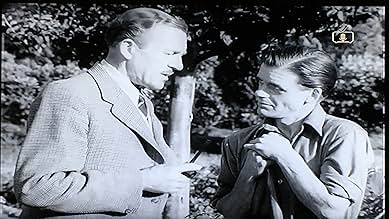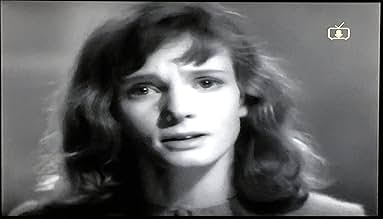Ajouter une intrigue dans votre langueSmilie that is. A tramp cures a teenager's amnesia and she fails to recognise him afterwards.Smilie that is. A tramp cures a teenager's amnesia and she fails to recognise him afterwards.Smilie that is. A tramp cures a teenager's amnesia and she fails to recognise him afterwards.
- Director
- Writers
- Stars
Avis en vedette
The vast amount of ink spilled on the subject of Michael Powell's 'Peeping Tom' (1960) is inclined to overlook this garrulous little curiosity (Norman Lee's directorial swan song), based on a 1947 West End hit by 'Peeping Tom's author Leo Marks. While Powell's film was ahead of its time in anticipating the way the camera shaped life, the hapless family in this film have spawned a young Goth decades too early ("We've taken her to the highest doctors and the lowest comedians, and still she can't laugh!"), with a backstory of child abuse by a responsible adult which anticipates both 'Peeping Tom' and Sam Fuller's 'The Naked Kiss'.
It would be interesting to see what a modern student of psychiatry would diagnose young Ruth's problem as...
It would be interesting to see what a modern student of psychiatry would diagnose young Ruth's problem as...
The movie is about the masculine and feminine forms that most are not always aware of. It could explain the reasons for its lower IMDB score than usual.
Without appearing sexual, it tries to go into the minds of the individual and how the man attempts to bring out the real personality and character locked within this vulnerable girl.
Most will gloss over it as nothing more than frivolous fun and talk but it deeply underscores the human form from the point of view of both sexes. One can learn a lot about improving ones relationship with each other from this movie alone.
A movie that will continue to strike a chord with many people for years to come, particularly if they take the time to understand the interaction of men and women.
Without appearing sexual, it tries to go into the minds of the individual and how the man attempts to bring out the real personality and character locked within this vulnerable girl.
Most will gloss over it as nothing more than frivolous fun and talk but it deeply underscores the human form from the point of view of both sexes. One can learn a lot about improving ones relationship with each other from this movie alone.
A movie that will continue to strike a chord with many people for years to come, particularly if they take the time to understand the interaction of men and women.
Elizabeth Henson has never laughed since her father died. Her mother, Betty Stockfield, and the rest of the veddy upper-class household are concerned. Then one day she spots tramp Bill Owen in the garden and laughs, so Miss Stockfield persuades the touchy Owen to help his daughter. He does so by teaching her generosity, which impresses everyone save Miss Henson's grandmother.
It's based on a stage play by Leo Marks, and is typical of a string of British movies of the era which emphasized low-key, amiable compassion -- my favorite of the type is LAST HOLIDAY, with a fine script by J. B. Priestley and J. Lee Thompson, humorous direction in a minor key by Henry Cass, and a typically spot-on performance by Alec Guinness. This movie, in contrast, seems a bit of a muddled translation, showing its stage origins in its stereotyped characters -- although Owen is fine. Some fine black-and-white photography by Geoffrey Faithfull.
It's based on a stage play by Leo Marks, and is typical of a string of British movies of the era which emphasized low-key, amiable compassion -- my favorite of the type is LAST HOLIDAY, with a fine script by J. B. Priestley and J. Lee Thompson, humorous direction in a minor key by Henry Cass, and a typically spot-on performance by Alec Guinness. This movie, in contrast, seems a bit of a muddled translation, showing its stage origins in its stereotyped characters -- although Owen is fine. Some fine black-and-white photography by Geoffrey Faithfull.
This movie certainly has potential going for it - Bill Owen for a start. But it is dreadfully let down by pretty indifferent acting and a muddled script which can't make up its mind what it is. Is this serious or comic? It deals with a serious theme - mental illness. Then throws in some comic bits that are beyond the point presumably because Owen is in it. Then the acting is so wooden. I mean we know Henson is frigid, but after being put over Owen's knee and soundly spanked, would she act as if nothing has happened? The movie adds unlikely scene to unlikely scene till a not very convincing ending.
Ruth (Elizabeth Henson) hasn't laughed since her father died so when the passing tramp (Bill Owen) raises a smile from her his services are commandeered by the insufferable family. Of course Owen predictably teaches everyone a new way of living, but Henson remains frigid in her acting apart from in the scene where Owen puts her over his knee and gives her a good spanking. The scene is the liveliest in the movie, with Hensons legs flailing over Owens knee as he spanks away, but then she immediately returns to type as if nothing had happened. Surely after a spanking like that she would least be rubbing her bottom but no, she is so frigid that one wishes the tramp would repeat the dose. Sadly, the movie gets duller and duller from then on! 'As refreshing as a breath of spring air' as says the publicity? Hardly!
Meilleurs choix
Connectez-vous pour évaluer et surveiller les recommandations personnalisées
- How long is The Girl Who Couldn't Quite?Propulsé par Alexa
Détails
Box-office
- Budget
- 50 000 £ (estimation)
- Durée1 heure 25 minutes
- Couleur
- Rapport de forme
- 1.37 : 1
Contribuer à cette page
Suggérer une modification ou ajouter du contenu manquant

Lacune principale
By what name was The Girl Who Couldn't Quite (1950) officially released in Canada in English?
Répondre




















